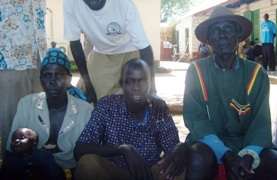FEATURE: Jonglei’s Bor, Murle play insecurity cards
By Philip Thon Aleu
October 10, 2008 (BOR) – Nearly eleven months after so-called ‘criminals’ from Bor and Murle communities in Jonglei state chose to cease hostilities without actual peace negotiations, flashes of armed raiding, child abduction and robbery are again emerging.
 Local leaders from both sides condemn the incidents but dismiss inquiries that insecurity is resuming, with the Bor county commissioner saying that he is optimistic that peace is still maintainable. The speaker of Jonglei assembly and Murle member of parliament, speaking on the phone from Juba, indicated that he is not aware of any insecurity.
Local leaders from both sides condemn the incidents but dismiss inquiries that insecurity is resuming, with the Bor county commissioner saying that he is optimistic that peace is still maintainable. The speaker of Jonglei assembly and Murle member of parliament, speaking on the phone from Juba, indicated that he is not aware of any insecurity.
Bor County Commissioner Abraham Jok Ariing tells Sudan Tribune that raiding “has not been so frequent this year and it is not a resumption of hostilities at all.”
But an attack Sunday on cattle herders about 15 miles from Bor, the state capital, may represent a threat to the relative peace that Bor has been enjoying since November 2007 when cattle raiding by Murle tribesmen left nearly forty people dead and thousands of cattle looted.
Murle traders dealing in the cattle roving business escaped two attempted robberies as they journeyed home recently, with the latest incident occurring October 5 when unknown armed men attacked them on Anyidi road.
In another incident, a schoolboy was abducted on his way home at Akuai-deng in September, says Alier Michael Malet, the civil administrator of Jalle Payam.
Murle pastoralists are said to have suffered isolation from Jonglei State benefits and there are fears that they have undergone acute ignored hunger and extremely poor economic, educational, and health assistance from United Nations agencies.
Bor county now provides escort to Murle traders on their way from Bor town to Anyidi. The South Sudan army then escort them to Acholl and the journey to Pibor, the Murle hometown.
Nevertheless, local officials are not sparing in their criticism of Murle traders. Bor County Commissioner Abraham Jok Ariing tells Sudan Tribune that Murle tribesmen stole 85 cattle on Oct. 1 at Mathiang in Baidit Payam.
Jonglei State Information Minister Taban Jouch says that Murle could be partly to blame for the attempt on their convoy, because the traders appear to have caused panic among local people, provoking the robbery.
“This is not our (Bor) behavior to rob a stranger in our area,” says a town resident identified as Majur.
“These attacks are never good. These people were joking,” notes Jok Ariing.
Even so, Bor community claims to have punished the robbers for the first attempted assault on Murle traders and pledges to continue with the same spirit. Bor Town, as the residents opt for Bor to do things her own way. “They never meant to attack but we shall arrest them and be punished,” promises Jok Ariing.
Murle cattle traders started marching to Bor in Jonglei in June, four years after a peace deal failed. Arms in the hands of civilians have been cited as the major cause of insecurity in the State. Leaders are divided as to which formula should be used for disarmament.
Pibor Commissioner Akot Maze told a council of ministers and local leaders in an interim report on August 13 that some politicians were dividing people for next year’s elections.
He called on the government to speed up peaceful disarmament, which he said was difficult to succeed in Murle. Bor, on the other hand, have not had past records of attacking but hold substantial illegal arms.
(ST)
